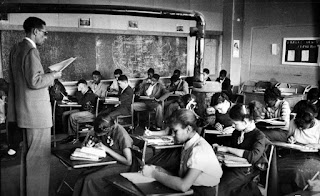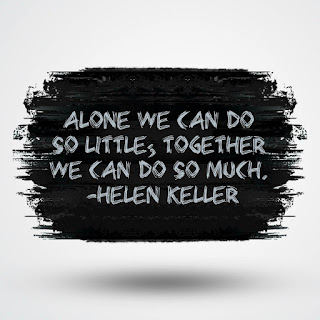Dear Faculty,
"I'm preparing students for the real world so I can't lower the standards." Leading a Professional Development session yesterday, this statement was shared. It's one of the most common concerns expressed by faculty when discussing paternalistic practices, which tend to further perpetuate the gap between historically marginalized students and nonmarginalized students. It operates under the premise that students of color, first generation students, female students, queer students, students with disabilities, immigrant students, refugee students, are less than, by being who they are. Their life experience is not to be accepted or shared in class. Their very way of existing is not good enough.
We show people what we value with the policies we enforce. The way that you write, speak, dress, the organizations you can publically endorse, all this is code-switching and as educators we should not demand it of our students.
Remember, equity is when we realize that our students are coming from various starting points. While trauma may be a part of that, how they cope with it is extremely different. How it impacts their learning is extremely different. We need to look at our students (all of them) and say, "how can I reach them?" Not, "they are broken from their past and will not succeed." That is the difference between educating and forcing assimilation.
The argument of preparing students for the real world is also ludicris unless the real world you are preparing them for is one with systemic racism and sexism and you want them to play along until they stumble upon an organization that accepts them for who they are. And educators, marginalized group members brave this discriminatory world everyday. We do not need to encounter it in our classrooms to be prepared. Our parents, guardians, k-12 teachers, perfect strangers, the media and law enforcement, have already taught us that we are not good enough as we are. As college professors, let's be the first person of authority in a students life to say, "you don't have to code-switch. You don't have to alter your physical appearance to learn. In fact, we are going to read authors that look like you because your voice matters. Your experience matters and although I may not have your experiences I see value in what you have survived."
When marginalized group members find themselves in a position that has been deemed as not their own, for instance, a black female doctor, a male Navajo college student, a refugee who is now a small business owner, we tend to assume that they got some sort of leg up. Like affirmative action, or a scholarship for being a minority. We rarely convey kindness rather we display shock and surprise that they made it so far, in a space we do not believe belongs to them. We dismiss the very real discrimination they have faced in order to achieve their dream.
As teachers we need to look at our students positively, listen to them and understand what it took for them to just be in the seats. Not label them by the sound of their name, not assume, but learn from them, how we can best support them.
Val's latest book, The Only Black Girl in the Room is available and registratiom for Val's Equity & Justice Workshop is LIVE



Comments
Post a Comment